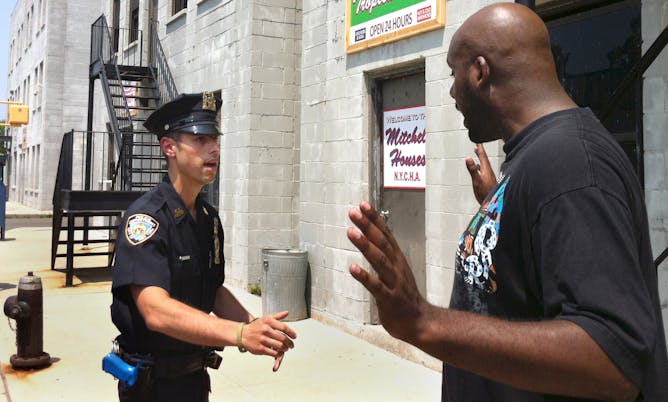
A 2012 training session between two New York police officers demonstrated a way stop-and-frisk encounters could be handled.
AP Photo/Colleen Long
Henry F. Fradella, Arizona State University; Michael D. White, Arizona State University
Former New York Mayor Michael Bloomberg apologized for his city's 'stop-and-frisk' police strategy. Two criminologists argue it isn't necessarily inherently racist – though New York's program was.
|
|
|
Ethics + Religion
|
-
Haimanti Roy, University of Dayton
Many women, Muslims and members of oppressed castes in India lack government-issued ID. Yet these documents may soon be required to prove their citizenship.
-
Patricia Illingworth, Northeastern University
Giving away big sums of money is supposed to make the world a better place. So, why are so many deep-pocketed donors getting themselves and the causes they support in trouble?
-
Diane Winston, University of Southern California, Annenberg School for Communication and Journalism
Around this time of the year, the Salvation Army's red kettles become visible as part of holiday giving. How this British evangelical organization came to the US is interesting history.
|
|
Health + Medicine
|
-
Jan Mutchler, University of Massachusetts Boston
More than 10 million older Americans struggle to make ends meet, with many going without necessary health care and basic needs as living costs rise.
-
Patricia Friedrich, Arizona State University
A recent study looked at how female doctors were introduced at a lecture series compared to how male doctors were introduced. The title 'Dr.' was used much more often for men.
|
|
|
|
|
|
|
|
Most read on site
|
-
Subhash Kak, Oklahoma State University
Google claims quantum supremacy – IBM says not so fast. One researcher explains why he doesn't see quantum computers outpacing classical computers any time soon ... and maybe not ever.
-
David Scott Witwer, Pennsylvania State University
Hoffa's ghost continues to haunt the labor movement.
-
Emily Moran, University of California, Merced
Masting is what biologists call the pattern of trees for miles around synchronizing to all produce lots of seeds – or very few. Why and how do they get on schedule?
|
|